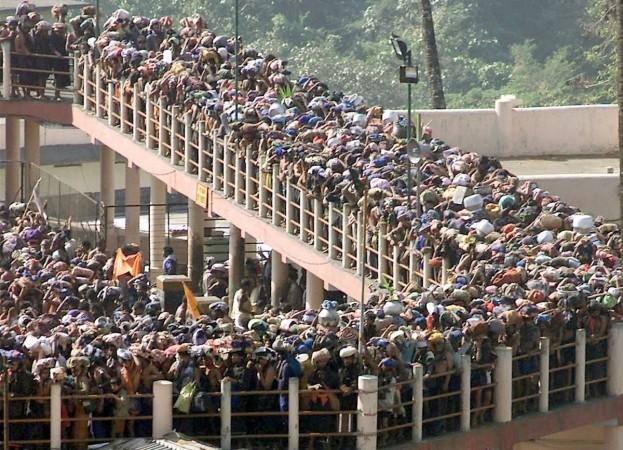
The Supreme Court, while hearing Monday the Sabarimala temple authorities' response to petitions challenging the ban on entry of women in their menstrual cycle into Kerala's hill temple, reportedly asked it to base its argument on the Constitutional validity of the matter.
The court observed that everyone has the right to worship God, and questioned temple authorities on they prohibiting a section of women from entering the temple. Travancore Devasom Board allows entry to only girls who are below 10 years of age and haven't reached puberty, and women above aged 50 or more, who have reached menopause, besides men, in the temple.
"What is the basis on which women have been denied entry into temples. Anyone can worship god, he is omnipresent," IBN Live quoted the court as saying.
"What right does temple have to forbid women from entering any part of temple, please argue on bedrock of Constitution," the three-judge bench of Justices Dipak Misra, Pinaki Chandra Ghose and NV Ramana observed, according to the News Minute.
"Can any tradition override constitutional provisions? We would like to see previous judgments which uphold ban on entry of women in any temple," Asian International News (ANI) quoted Justice Misra as saying.
Can "a woman can be denied permission to climb Mount Everest?" the Supreme Court asked, adding: "Gender discrimination in such a matter is unacceptable."
The apex court will hear the matter again Wednesday.
The Supreme Court in February heard a batch of pleas seeking removal of the ban on women's entry to Sabarimala temple, which is dedicated to Lord Ayyappa. During the hearing, the court had asked the temple board why it discriminates between women and men when Hindu scriptures like the Vedas and Upanishads do not.
The court had then appointed senior advocate Raju Ramachandran amicus curiae — a person who provides the court with information needed in a matter, but does not represent any of the parties in the case.
Another battle against gender discrimination at a place of worship was fought in Maharashtra and won by women activists who challenged restrictions on their entry to the sanctum sanctorum of the Shani Shingnapur temple in the Ahmednagar district.
The Bombay High Court observed women cannot be barred from entering the temple's sanctum sanctorum where the stone idol of Shani is installed. Following the court's observation, the ban was lifted and women along with activist Trupti Desai were allowed to enter the temple and offer prayers.
Hearing on women entry in Sabrimala temple: SC questions whether "A woman can be denied permission to climb Mount Everest".
— ANI (@ANI_news) April 11, 2016
Sabrimala issue: SC observes that "gender discrimination in such a matter is unacceptable". Next hearing to take place on April 13,Wednesday — ANI (@ANI_news) April 11, 2016









